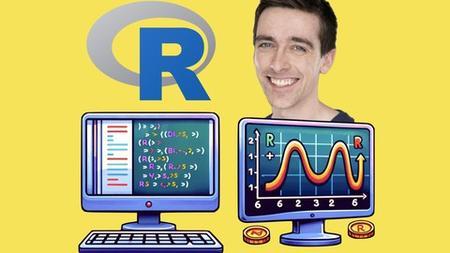
English | MP4 | AVC 1280×720 | AAC 44KHz 2ch | 97 lectures (5h 53m) | 2.67 GB
A former Google data scientist teaches you R starting with the basics, and learning common tools for data science.
This comprehensive R course starts from the very basics, covering vectors, matrices, data frames, and more, ensuring a solid foundation for beginners.
Start your journey to becoming an R expert today!
Key Features:
- Learn R from scratch with a step-by-step approach
- Hands-on exercises for practical experience
- Understand data structures and data manipulation in R:
- Vectors
- Matrices
- Data frames
- Lists
- Subsetting data
- apply() functions on matrices
- Learn about probability distributions and R’s tools for probability.
- r functions for generating random variables
- d functions for finding the probability of single events
- p functions for finding cumulative probabilities
- q functions for finding percentiles
- Learn about common probability distributions commonly used in data science, including the binomial, geometric, exponential, normal, Poisson, gamma, and uniform distributions.
What you’ll learn
- Master the basic parts of R like vectors and matrices
- Learn more complex data structures like data frames and lists
- Learn R’s probability functions for simulating data and calculating probabilities
- Practice these skills using Udemy’s built-in coding exercises
Table of Contents
Introduction
1 Introduction
2 Install R and RStudio
Creating vectors and assignment
3 Variables and assignment
4 Variables and assignment coding assignment
5 Vectors with c()
6 Vectors with c() solution
7 The colon
8 colon coding solution
9 seq()
10 seq() exercise 1 solution
11 seq() exercise 2 solution
12 rep()
13 rep() exercise 1 solution
14 rep() exercise 2 solution
Vectorized operations
15 Introduction to vectorized operations
16 Adding a number to all elements of a vector solution
17 Converting Celsius to Fahrenheit solution
18 Adding two vectors – weights of twins solution
Basic functions on vectors
19 Common functions in R
20 mean() median() sum() length() solution
21 sd() and var() solution
22 summary() solution
23 Missing data and na.rm
Subsetting vectors
24 Basics of subsetting
Booleans
25 Booleans
26 Subsetting a vector with a boolean
Matrix basics
27 Creating matrices with cbind and rbind
28 Creating matrices with matrix()
Matrix subsetting
29 Matrix subsetting
30 Matrix subsetting with booleans
Matrix operations
31 apply()
data frames
32 Data frames
lists
33 Lists
Generating random numbers and splitting training and testing data
34 sample()
35 Subsetting data randomly with sample()
Bernoulli random variables
36 Binary random variables, sample space
37 Simulating Bernoulli random variables with rbinom()
38 Parameters – The population proportion
39 Sample statistics – mean() for calculating sample proportions
40 dbinom()
Binomial random variables
41 Binomial random variables
42 mean(rbinom()), Law of Large Numbers
43 Estimating probabilities with mean() and rbinom()
44 dbinom() intro
45 Expected Value
46 Variance and Standard Deviation
47 cdf and pbinom()
48 Other types of inequalities and intervals
49 Visualizing the cdf
50 The median
51 qbinom()
52 Problem-solving with qbinom()
Binom.test
53 binom.test
Hypergeometric distribution
54 Hypergeometric random variables
Normal Distribution
55 Normal random variables and the empirical rule
56 Empirical rule with rnorm()
57 dnorm() and continuous distributions
58 pnorm() and the empirical rule
59 qnorm()
Sums, CLT, Normal Approximations
60 Expected value of a sum
61 Standard deviation of a sum
62 Sums of normal random variable is normal
63 Mean and sd of binomial distribution, Normal approximation to the binomial
Probability Geometric distribution
64 Geometric random variables
65 rgeom()
66 dgeom()
67 Expected value and standard deviation of geometric distribution
68 pgeom(), the cdf
69 qgeom()
Probability Negative Binomial distribution
70 Negative binomial random variables
71 rnbinom()
72 dnbinom()
73 Mean and standard deviation of negative binomial distribution
74 pnbinom()
75 qnbinom()
Probability Exponential Distribution
76 Exponential random variables
77 rexp()
78 dexp()
79 Expected value and sd of exponential distribution
80 pexp() and memorylessness
81 qexp()
Probability Gamma distribution
82 Gamma distribution and rgamma()
83 Expected value and standard deviation of gamma distribution
84 dgamma() and pgamma()
85 qgamma()
86 Normal approximation to gamma distribution
Probability Poisson distribution
87 Poisson distribution and rpois()
88 dpois()
89 Expected value and standard deviation
90 ppois()
91 qpois()
92 Dealing with different time periods
93 Normal approximation to the Poisson distribution
Probability Uniform distribution
94 Uniform distribution, runif() and dunif()
95 Mean and standard deviation of the uniform distribution
96 punif()
97 qunif() and the inverse transform method
Resolve the captcha to access the links!